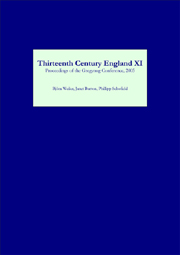Book contents
- Frontmatter
- Contents
- LIST OF ILLUSTRATIONS
- PREFACE
- CONTRIBUTORS
- ABBREVIATIONS
- ‘Adam of Bristol’ and Tales of Ritual Crucifixion in Medieval England
- Ethics and Office in England in the Thirteenth Century
- Some Aspects of the Royal Itinerary in the Twelfth Century
- The minority governments of Henry III, Henry (VII) and Louis IX compared
- Scottish Queenship in the Thirteenth Century
- Ethnicity, personal names, and the nature of Scottish Europeanization
- Power, Preaching and the Crusades in Pura Wallia c.1180–c.1280
- A Forgotten War: England and Navarre, 1243·4
- The Appointment of Cardinal-deacon Otto as Legate in Britain (1237)
- Matthew Paris and John Mansel
- The Burial of Noblewomen in Thirteenth-Century Shropshire
- Dynastic Conflict in thirteenth-century Laxton
- Absenteeism: The Chronology of a Concept
Ethics and Office in England in the Thirteenth Century
Published online by Cambridge University Press: 12 September 2012
- Frontmatter
- Contents
- LIST OF ILLUSTRATIONS
- PREFACE
- CONTRIBUTORS
- ABBREVIATIONS
- ‘Adam of Bristol’ and Tales of Ritual Crucifixion in Medieval England
- Ethics and Office in England in the Thirteenth Century
- Some Aspects of the Royal Itinerary in the Twelfth Century
- The minority governments of Henry III, Henry (VII) and Louis IX compared
- Scottish Queenship in the Thirteenth Century
- Ethnicity, personal names, and the nature of Scottish Europeanization
- Power, Preaching and the Crusades in Pura Wallia c.1180–c.1280
- A Forgotten War: England and Navarre, 1243·4
- The Appointment of Cardinal-deacon Otto as Legate in Britain (1237)
- Matthew Paris and John Mansel
- The Burial of Noblewomen in Thirteenth-Century Shropshire
- Dynastic Conflict in thirteenth-century Laxton
- Absenteeism: The Chronology of a Concept
Summary
In medieval England, contemporary debate regarding the behaviour of royal officers seems to have developed alongside the growth in administration. Among the demands of the political community, the better control of the activity of officials ranked high. Documents of the period of crisis of 1258–1265, for instance, show that this question was one of the major concerns of the reformers. The Provisions of Oxford arranged for four knights in each county to hear all complaints against sheriffs and other officials, and stated firmly that one of the justiciar's duties was to control the activity of lesser judges and officials. And the gravamina presented in January 1264 to Louis IX by the reforming barons listed the abuses of royal agents: the corruption of escheators, the disastrous consequences of the sale of county farms. The fact that justice was denied or delayed was also denounced as were the bad practices of guardians of vacant churches and the abuse of the right of purveyance.
It is probably impossible to estimate the level of corruption among royal – or baronial – officials, and it has been suggested that the protests were also aimed at what was perceived as an intrusive government. However, the royal government was aware of the need for reform: if the king wished to preserve his prerogative when it came to nominate and control his ministers, he also responded to some of the attacks against his officials.
- Type
- Chapter
- Information
- Thirteenth Century England XIProceedings of the Gregynog Conference, 2005, pp. 16 - 30Publisher: Boydell & BrewerPrint publication year: 2007



